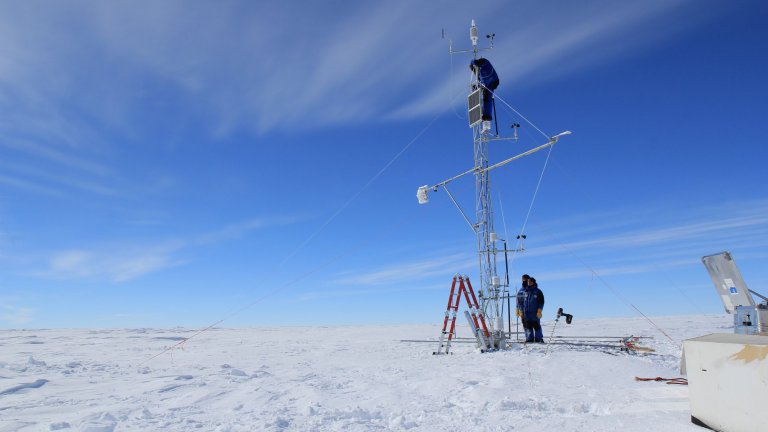
© Bruno Jourdain / IGE / CNRS Images
View the mediaScientific news
For the Dubai World Expo, which will open on October 1, 2021, the CNRS is offering visitors of the French pavilion a scientific immersion in the heart of Antarctica. A continent of ice that is essential to understand and measure climate change.

© Bruno Jourdain / IGE / CNRS Images
View the mediaSixty years ago, on 23 June 1961, the Antarctic Treaty came into force, signed by the major Western powers and the USSR and since ratified by many other countries. Its aim was as simple as it was admirable: to ensure in the interests of humanity, that Antarctica would be kept free of conflict between nations and would remain a non-militarised area dedicated to science and international cooperation. It forbids nuclear testing and the burial of radioactive waste. Now more than ever, Antarctica is a genuine open-air laboratory, a reflection of the upheaval our planet is experiencing.
Particularly affected by climate change, which is melting the ice and reducing aquatic and terrestrial biodiversity, it is a unique place to study the causes and effects. And this is not new! You can see it in the wide selection of films we offer: scientists were already warning about the same issues of pollution, global warming... twenty years ago, like Claude Lorius, a renowned glaciologist and one of the first "whistleblowers" on the climate... You can find his main films in our archives, but also our series "Alert at the poles", which gives an overview of the major issues related to the preservation of Antarctica.
This is the reason why the CNRS is represented there through two research stations: the Dumont-d'Urville station, the nearby Cap Prud'homme station, which is located on the coast, and the Concordia station in the heart of the continent. These stations allow scientists to carry out a wide range of research projects throughout the year: climate history and evolution, glaciology, physics of global ocean currents, astronomy, astrophysics, biogeochemistry, and of course the environment and ecology. It is therefore logical that for the Dubai World Expo which will open its doors on October 1, 2021, the CNRS has decided to offer visitors of the French pavilion a scientific immersion in the heart of the Antarctica. Visitors will learn about the cutting-edge research being conducted in Antarctica and the challenges involved, through a fully immersive experience.
Our work is guided by the way scientists question the world around them and we translate their research into images to help people to understand the world better and to awaken their curiosity and wonderment.